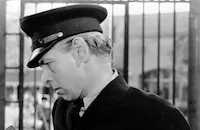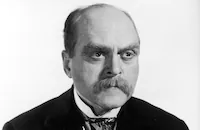Wild Boys of the Road

Brief Synopsis
Cast & Crew
William A. Wellman
Frankie Darro
Edwin Phillips
Rochelle Hudson
Sterling Holloway
Arthur Hohl
Film Details
Technical Specs

Synopsis
Eddie Smith helps his friend, Tommy Gordon, sneak into a high school dance dressed as a girl because Tommy cannot afford the price of admission. Tommy confides to Eddie that because his mother has been unable to find work, he is planning to leave school to look for work himself. Eddie asks Tommy to wait until he speaks to his father about helping the family, but arrives home to discover that his father also has lost his job. Eddie sells his car to help, but when his father still cannot find work, Eddie and Tommy decide to leave home together.
On the train, they meet Sally, another teenager, who is going to live with her aunt in Chicago. As they head toward Chicago, more and more children join them on the trains. Although the Chicago police turn people away because there are no jobs even for those who already live there, they allow Sally and her traveling companions to continue because Sally has a letter from her aunt. Sally's Aunt Carrie is happy to see them. Her business, a brothel, is doing well, and for a few minutes it appears that the children have found a home. While they eat, however, the brothel is raided, and the children find themselves on the road again.
Along the road, the traveling children encounter many hardships. One girl is raped, Tommy's foot is mangled by the train and has to be amputated, and he and the others are kicked out of a camp in Columbus, Ohio. Finally, the trio ends up living in a dump in New York. Eddie finds a job but needs new clothes in order to keep it. Sally, Tommy and Eddie panhandle for the money. Then two men ask Eddie to deliver a note to a movie theater cashier. The note contains a demand for money, and the cashier screams for the police. The children are arrested and appear before a judge who has children of his own. He offers to get them jobs, dismisses the charges against them and tells them they will soon rejoin their families.

Director

William A. Wellman
Cast

Frankie Darro

Edwin Phillips

Rochelle Hudson

Sterling Holloway

Arthur Hohl

Ann Hovey

Minna Gombell

Grant Mitchell

Claire Mcdowell

Robert Barrat
Willard Robertson

Ward Bond
Adrian Morris
Shirley Dunstead
Crew
Daniel Ahearn
Earl Baldwin
Charles Davis
Leo F. Forbstein
Esdras Hartley
Cyril Hume
Claude Hutchinson
Mac James
Vernon Larson
Robert Lee
Scotty Moore
Thomas Pratt
William Schurr
Arthur L. Todd

Photo Collections
Videos
Movie Clip






Trailer
Film Details
Technical Specs

Articles
Wild Boys of the Road
Wild Boys of the Road was William Wellman's attempt to dramatize some disturbing developments in the social fabric of America while at the same time reflecting some of the optimism inherent in the New Deal politics of Franklin D. Roosevelt. Though normally very frugal with film budgets, Wellman went over his allotted production costs on this film due to his emotional involvement in the subject matter. Unfortunately, Wild Boys of the Road didn't do well commercially when released and some critics felt the happy ending was unrealistic. While that may be true in part, everything that comes before the fadeout is tough and uncompromising, particularly a scene where a boy loses his leg to an oncoming train. In fact, studio executive Hal Wallis requested changes to the train amputation sequence in a memo: "I am just looking at the stuff where the train passes over and cuts the kid's (Edwin Phillips) leg off. There is no doubt about it, it is effective but if we ever left this in, there would be more premature births in the theatre and more people dying than were killed in the World War. I hope...you will get it over more by suggestion."
Part of the reason Wellman succeeded in capturing such a naturalistic, documentary-like flavor is because of the real locations used and a cast of mostly unknown actors, Frankie Darro and Rochelle Hudson being the two exceptions. Dorothy Coonan, who plays Dottie, a tough, young girl who rides the rails, is a particular standout and had previously worked as a dancer in Busby Berkeley musicals such as Gold Diggers of 1933. Wellman became infatuated with Dorothy while she was making Wild Boys of the Road and soon after they married, making her Wellman's fourth and final wife.
Director: William A. Wellman
Producer: Robert Presnell Sr. (uncredited)
Screenplay: Daniel Ahern (story), Earl Baldwin
Cinematography: Arthur L. Todd
Editor: Thomas Pratt
Art Direction: Esdras Hartley
Music: Bernhard Kaun (uncredited)
Cast: Frankie Darro (Edward "Eddie" Smith), Edwin Phillips (Tommy Gordon), Rochelle Hudson (Grace), Dorothy Coonan (Sally), Sterling Holloway (Ollie), Arthur howl (Dr. Henry A. Heckel).
BW-69m.
by Jeff Stafford

Wild Boys of the Road
Quotes
Trivia
The movie shown in the movie theater scene (about an hour into the film) is another Warner Bros. release, Footlight Parade (1933).
Notes
Daniel Ahearn's story was entitled "Desperate Youth." According to news items in Film Daily, Helen Mack, Jean Parker and J. Farrell MacDonald were considered for roles. Modern sources credit Perc Westmore with makeup and Robert Presnell as producer. Dorothy Coonan, who plays Sally, had been a lead Busby Berkeley dancer. She quit films soon after completing this film to wed director Wellman, to whom she was married until his death in 1975. According to a modern source, as a publicity stunt to boost this picture and Coonan's career, a news story was planted in the New York Sun noting that the freckle-faced Coonan had taken out a $100,000 insurance policy to protect her in case she "lost" her freckles. The news item, which is reproduced in a Wellman biography, states that her Warner Bros. contract required her to have freckles.















